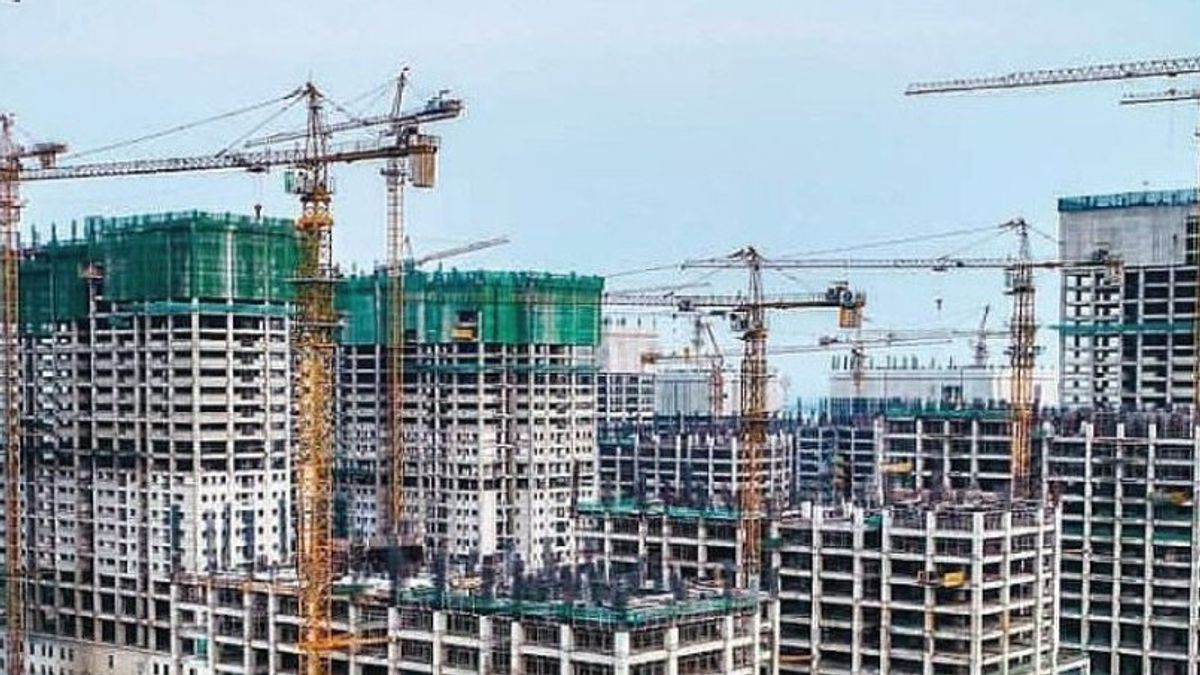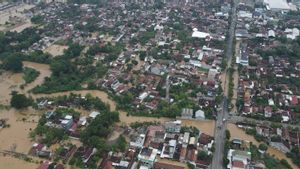JAKARTA - The COVID-19 pandemic in 2020 is the biggest challenge hitting the property business. The economic downturn, which led to changes in consumption and investment priorities for the people, has left property products behind. Even so, this sector is still relatively able to survive amid a significant decline in sales.
Based on an analysis conducted by Indonesia Property Watch (IPW), sales of the housing market throughout 2020 in Jabodebek-Banten as a national housing benchmark decreased dramatically by 31.8 percent compared to sales in 2019. In fact, this is the lowest sales level since the property cycle slowed down in 2013.
Still referring to the same source, sales of the price segment below Rp. 300 million underwent the greatest pressure and experienced a decline throughout 2020 by 42.9 percent. Then followed by the house segment with prices above Rp. 2 billion, which fell by 41.1 percent.
Meanwhile, in the middle price segment of Rp.301 to 500 million and the Rp501 million to Rp.1 billion segment, they also decreased by 34.2 percent and 25.6 percent, respectively. Meanwhile, what is interesting is that the sales of the house price segment between Rp1 billion and 2 billion have increased by 12.5 percent.
CEO of Indonesia Property Watch, Ali Tranghanda said the market segment continues to shift to a lower one and makes the home market in the middle segment become quite large, up to around IDR 2 billion. Part of the middle market relatively did not make house purchases and were forced to postpone their purchases.
Meanwhile, said Ali, in the lower segment, with its current condition, it is relatively running out of purchasing power to buy housing segments under Rp. 300 million. As previously estimated by Indonesia Property Watch, even though the lower middle market is under pressure, the property market in the country is still quite well supported by the potential purchasing power that exists, although it is still marked by delays in purchases.
Furthermore, Ali said, middle to upper class people are estimated to be 'saviors' in the midst of current uncertain conditions.
Entering 2021, said Ali, some developers are still optimistic to be able to book better sales compared to 2020. However, several things need to be considered related to factors that currently greatly affect future sales.
"The property market in 2021 is still very unstable. Developers should be able to read market dynamics better, because market conditions are still very fragile. Nobody can predict exactly when property will rise because this is not an economic statistic that can be taken into account," he said, quoted from the official website of 'Property and The City', Wednesday, January 13.

According to Ali, the market gap in certain segments is still very likely even though it is still overshadowed by the risk of several factors that will greatly affect the market, including the implementation of the PSBB policy, vaccine expectations and the scenario for Indonesia's future economic recovery, as well as future global economic conditions.
Based on the analysis conducted by Indonesia Property Watch, the current movement of housing sales is strongly influenced by the implementation of the PSBB policy. During the tightening of the PSBB, the housing market experienced a significant decline in sales.
Even though the developers are still adapting to the digital marketing system, this relatively does not guarantee an increase in transactions at that time. Due to the character of the property market that cannot be entirely submitted through online mechanisms.
There is Hope from VaccinesAli said that the COVID-19 vaccine is currently his hope to be able to provide optimism for an improving housing market. With the current clinical trial, the vaccine is relatively effective, although it is estimated that some experts will still be refined in the future.
[/ read_more]
Looking at the duration of the vaccine administration up to 1 year ahead, it is estimated that the effectiveness of the new vaccine will be seen in the middle of 2021.
"Do not let the administration of this vaccine make the public off guard so that the effectiveness of the vaccine cannot catch up with the excessive optimism of the community so that it releases the health protocol," he said.
As is known, currently there are five vaccine brands ordered by Indonesia. Four of them must be purchased. Starting from the Sinovac, Novavax, AstraZeneca, to Pfizer vaccines.

The total number of orders that have been confirmed reaches 329 million. This includes the Pfizer vaccines (50 million) and AstraZeneca (50 million) which have entered the process of finalizing the volume purchase agreement. Apart from that, there is a potential purchase of 334 million from the need for 426 million.
Indonesia has also received assurance from GAVI regarding the COVAX / GAVI vaccine with a total of 54 million doses that will be given free of charge or free of charge. However, until now the Indonesian government is still lobbying for another 54 million doses, bringing the total to 108 million doses.
Towards Economic RecoveryThe ASEAN Development Bank predicts Indonesia's economic growth to approach 5 percent in 2021. This prediction can be seen from Indonesia's economic growth which began to strengthen in the second and third quarters of 2020.
In general, the fundamentals of the national economy are still relatively good, especially compared to other neighboring countries. Nevertheless, it should be noted that the only thing that sustains Indonesia's economic growth during this pandemic is high government consumption.
Including cash assistance and other assistance to maintain people's purchasing power. Of course this is not healthy for the economy in the future.
"The economic recovery of the lower middle class will take a long time and it is feared that the housing market in this segment will remain relatively depressed," said Ali.
However, according to Ali, on the other hand, there is hope that the upper middle class will be relatively well maintained and will enliven the property market when the pandemic begins to subside.
Global Economic SituationAlthough many predict that the global economy will grow better, it should be noted that the re-imposed lockdown status in several countries can disrupt the economy at large.
Not to mention, Ali said, developments in China itself were still relatively disrupted by the re-entry of COVID-19. Positive growth, especially in China, will have a major impact on the global economy due to better export-import activities.
Furthermore, according to Ali, with several risk factors and uncertain conditions, he still hopes that the property market will grow in 2021.
"Property in 2021 will be very challenging for players in the national property market. However, when the pandemic subsides, the property market will increase exponentially because the potential for delayed demand is still very large. And it will only be seen in the second semester of 2021," said Ali.
With a deep enough decline in 2020, according to Ali, in general the property market should be better in 2021. There is an opportunity for an increase in the range of 10 percent to 15 percent. However, if there are no extraordinary events that have a negative impact on the property market itself.
[/ read_more]
The English, Chinese, Japanese, Arabic, and French versions are automatically generated by the AI. So there may still be inaccuracies in translating, please always see Indonesian as our main language. (system supported by DigitalSiber.id)













